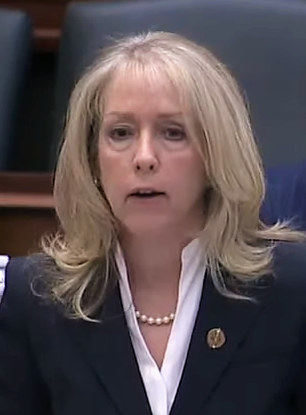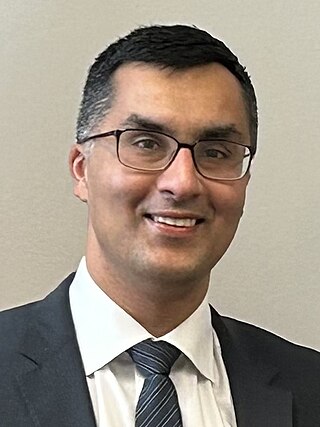
Medicare is an unofficial designation used to refer to the publicly funded single-payer healthcare system of Canada. Canada's health care system consists of 13 provincial and territorial health insurance plans, which provide universal healthcare coverage to Canadian citizens, permanent residents, and depending on the province or territory, certain temporary residents. The systems are individually administered on a provincial or territorial basis, within guidelines set by the federal government. The formal terminology for the insurance system is provided by the Canada Health Act and the health insurance legislation of the individual provinces and territories.

The Hospital for Sick Children (HSC), corporately branded as SickKids, is a major pediatric teaching hospital located on University Avenue in Toronto, Ontario, Canada. Affiliated with the Faculty of Medicine of the University of Toronto, the hospital was ranked the top pediatric hospital in the world by Newsweek in 2021.

Healthcare in Canada is delivered through the provincial and territorial systems of publicly funded health care, informally called Medicare. It is guided by the provisions of the Canada Health Act of 1984, and is universal. The 2002 Royal Commission, known as the Romanow Report, revealed that Canadians consider universal access to publicly funded health services as a "fundamental value that ensures national health care insurance for everyone wherever they live in the country."
Extendicare Inc. is a Canadian for-profit long-term care (LTC) provider that offers housing, care and related services to seniors. It operates over 100 care facilities and is based in Markham, Ontario. The company operates retirement residences and long-term care facilities under the Extendicare, Esprit Lifestyle and ParaMed brands, with 23,000 employees.
University Health Network (UHN) is a public research and teaching hospital network in Toronto, Ontario, Canada. It is the largest health research organization in Canada and ranks first in Canada for total research funding. It was named Canada's top research hospital by Research Infosource from 2015 to 2022. The network includes three acute care hospitals – Toronto General Hospital, Toronto Western Hospital, Princess Margaret Cancer Centre – the Toronto Rehabilitation Institute, and The Michener Institute, a post-secondary institution granting diplomas and certificates in health sciences and leadership. In the 2019-2020 fiscal year, there were over 39,000 acute inpatient stays and close to 121,000 emergency department visits across the three acute care hospitals.

Merrilee K. Fullerton is a Canadian physician and former politician who represented Kanata—Carleton in the Legislative Assembly of Ontario from 2018 to 2023. A member of the Ontario Progressive Conservative (PC) Party, Fullerton was the minister of training, colleges, and universities from 2018 to 2019, minister of long-term care from 2019 to 2021, and minister of children, community and social services from 2021 to 2023.

Rajan Sawhney is a Canadian politician from the United Conservative Party in Alberta. She was elected in the 2019 Alberta general election to represent the electoral district of Calgary-North East in the 30th Alberta Legislature. On April 30, 2019, she was appointed to be the Minister of Community & Social Services in the Executive Council of Alberta. On July 8, 2021, she was shuffled into the Minister of Transportation.

The COVID-19 pandemic in Ontario was a viral pandemic of coronavirus disease 2019 (COVID-19), a novel infectious disease caused by severe acute respiratory syndrome coronavirus 2 (SARS-CoV-2). The first confirmed case of COVID-19 in Canada was announced on January 25, 2020, involving a traveller who had recently returned to Toronto from travel in China, including Wuhan. Ontario has had the largest number of confirmed COVID-19 cases among Canada's provinces and territories, but due to having the largest population, only ranks sixth adjusted per capita. Ontario surpassed one million lab-confirmed COVID-19 cases on January 24, 2022; one day before the anniversary of the first confirmed case on January 25, 2020.

Bonnie J. Fraser Henry is a Canadian physician and public servant who has been the provincial health officer at the British Columbia Ministry of Health since 2014. Henry is also a clinical associate professor at the University of British Columbia. She is a specialist in public health and preventive medicine, and is a family doctor. In her role as provincial health officer, Henry notably led the response to COVID-19 in British Columbia (BC).
Allison Joan McGeer is a Canadian infectious disease specialist in the Sinai Health System, and a professor in the Department of Laboratory Medicine and Pathobiology at the University of Toronto. She also appointed at the Dalla Lana School of Public Health and a Senior Clinician Scientist at the Lunenfeld-Tanenbaum Research Institute, and is a partner of the National Collaborating Centre for Infectious Diseases. McGeer has led investigations into the severe acute respiratory syndrome outbreak in Toronto and worked alongside Donald Low. During the COVID-19 pandemic, McGeer has studied how SARS-CoV-2 survives in the air and has served on several provincial committees advising aspects of the Government of Ontario's pandemic response.
The COVID-19 pandemic in Toronto was a viral pandemic of coronavirus disease 2019 (COVID-19), a novel infectious disease caused by severe acute respiratory syndrome coronavirus 2 (SARS-CoV-2), localized in Toronto. Toronto is the most populous city in Canada, and the fourth most populous city in North America.

Homeless individuals are more likely to contract COVID-19 than those with permanent housing access. This is due to the environments that homeless people live in, which often suffer overcrowding and/or a lack of access to adequate sanitation. Homeless individuals are also more likely to suffer underlying health conditions, which increases the risk of death caused by COVID-19. The closure of public facilities has negatively impacted the homeless population, as reduced access to toilet facilities and support services has affected their hygiene and mental health respectively. Initiatives have been introduced by governments and at local levels in attempts to reduce the impact on the homeless.
Dr. Shelley Deeks, MD, MHSc, FRCPC, FFAFPM, is a Canadian public health expert who is the chair of the National Advisory Committee on Immunization. Her advertised "specialities include communicable disease control, outbreak investigations, vaccine safety, epidemiology and program evaluation." She is a fellow of the Royal College of Physicians of Canada and the Australian Faculty of Public Health Medicine. Deeks was the executive lead in Ontario's COVID-19 pandemic response in 2020 in her role at Public Health Ontario.
Naheed Dosani is a palliative care physician based in Ontario, Canada, who founded and leads the Palliative Education and Care for the Homeless (PEACH) program. For his efforts in providing mobile healthcare to individuals with vulnerable housing or are homeless, Dosani has received a Meritorious Service Cross from the Governor General of Canada (2017), and a Canadian Medical Association Award for Young Leaders (2020).
Paul Caulford is a Canadian advocate, academic, and family doctor in Scarborough, Toronto who provides free healthcare to refugees, undocumented migrants and other newcomers who are unable to get healthcare through the formal channels.
Leslie Shanks is a Canadian medical doctor who served as the president of Médecins Sans Frontières Canada, the medical director of MSF Netherlands, and who led humanitarian responses in Yugoslavia, Zaire and Sudan.
COVID-19 vaccination in Ontario began in December 2020, when the first doses of the Pfizer vaccine were administered. In February 2021, shipments for both the Pfizer and Moderna vaccines increased significantly. By May 2021, over 50 percent of Ontarians had received their first dose. By the beginning of 2022, over 80 percent of Ontarians had received their first dose.

Adil Shamji is a Canadian physician and politician who has represented Don Valley East in the Ontario Legislative Assembly since 2022, as a member of the Ontario Liberal Party. Before entering politics, Shamji was an emergency physician at Michael Garron Hospital. He was born in Canada to Gujarati immigrant parents from East Africa. On July 4, 2023, Shamji announced his candidacy for the 2023 Ontario Liberal Party leadership election.

19 to Zero is a not-for-profit behavioural sciences initiative based in Calgary, Alberta, Canada. Hosted at the University of Calgary, the public–private partnership is made up of around 500 members including public health specialists, academics, behavioural psychologists, marketers and multimedia creators. Its purpose is to increase confidence in vaccines for COVID-19 and other diseases by tackling vaccine hesitancy. The group publishes materials on its website and through partner organizations, including videos, billboards, presentations, brochures and in-person events.
Stephen Wesley Hwang is an American-born Canadian internal-medicine physician and population health epidemiologist. He is a professor in the Department of Medicine and director of the Division of General Internal Medicine at the University of Toronto. Hwang is also the St. Michael's Hospital's inaugural chair in Homelessness, Housing, and Health and director of the MAP Centre for Urban Health Solutions.








